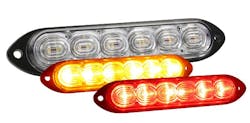Grote celebrates FMCSA waiver renewal
The Federal Motor Carrier Safety Administration’s decision to extend Grote Industries’ exemption for brake-activated pulsating warning lights underscores the safety technology’s crucial role in safeguarding drivers and reducing crashes on American roadways, the manufacturer reports.
Originally granted in 2020, the new five-year waiver allows motor carriers to equip tank trailers with amber-colored auxiliary lamps that complement the steady-burning red lamps required by federal regulations in an effort to curb rear-end collisions. The agency’s decision confirms Grote’s products, including its strobe and stop lamps, are an “important tool” in reducing the frequency and severity of these incidents based on real-world data, the company maintained.
“The results speak for themselves,” Mark Blackford, Grote director of national fleet sales, said in a news release. “When you see reductions of this magnitude—in both the frequency and severity of rear-end collisions—it confirms that this technology is making a measurable difference.
“The renewal of this waiver allows us to continue supporting fleets with a proven solution that helps improve safety on our roadways.”
See also: FMCSA extends NTTC, Grote exemptions
Since the waiver was first issued, more than 150,000 vehicles have been outfitted with Grote’s auxiliary strobe and stop lamp, logging over 250 million miles on the road, Grote said. One large national fleet customer experienced a 33% reduction in rear-end crashes per mile compared to a baseline fleet without the system, based on data from over 1 billion miles driven. In cases involving personal injuries, the same fleet recorded a 75% reduction. A second major fleet customer reported a 52% decrease in overall recordable incidents per vehicle and a 75% reduction in the severity of incidents.
Built to increase visibility and awareness when braking occurs, Grote’s lamps pulse an amber light five times in four seconds before settling into a solid red state, ensuring maximum attention from potentially distracted drivers without causing distraction or confusion, Grote explained. The request to renew the exemption, which runs through 2030, was supported by documented safety results submitted by the company and by fleets during the public comment period.
“This is more than a product—it’s a proven life-saving solution,” Blackford concluded. “Fleets are seeing fewer accidents, less property damage, and most importantly, fewer injuries. This waiver extension is a win for safety and a clear call to continue adopting advanced warning systems like ours.”

